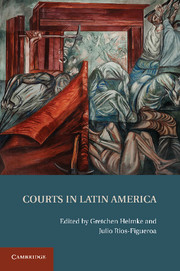Book contents
- Frontmatter
- Contents
- Contributors
- Acknowledgments
- Introduction
- 1 Institutions for Constitutional Justice in Latin America
- 2 Enforcing Rights and Exercising an Accountability Function
- 3 Strategic Deference in the Colombian Constitutional Court, 1992–2006
- 4 From Quietism to Incipient Activism
- 5 “Faithful Servants of the Regime”
- 6 Power Broker, Policy Maker, or Rights Protector?
- 7 Legalist versus Interpretativist
- 8 A Theory of the Politically Independent Judiciary
- 9 Courts, Power, and Rights in Argentina and Chile
- 10 Bolivia
- 11 The Puzzling Judicial Politics of Latin America
- Index
- References
4 - From Quietism to Incipient Activism
The Institutional and Ideological Roots of Rights Adjudication in Chile
Published online by Cambridge University Press: 01 June 2011
- Frontmatter
- Contents
- Contributors
- Acknowledgments
- Introduction
- 1 Institutions for Constitutional Justice in Latin America
- 2 Enforcing Rights and Exercising an Accountability Function
- 3 Strategic Deference in the Colombian Constitutional Court, 1992–2006
- 4 From Quietism to Incipient Activism
- 5 “Faithful Servants of the Regime”
- 6 Power Broker, Policy Maker, or Rights Protector?
- 7 Legalist versus Interpretativist
- 8 A Theory of the Politically Independent Judiciary
- 9 Courts, Power, and Rights in Argentina and Chile
- 10 Bolivia
- 11 The Puzzling Judicial Politics of Latin America
- Index
- References
Summary
In the panorama of Latin American judicial politics, Chile's courts have been most notable for their deference and conservatism in rights cases. Neither the ordinary courts nor the constitutional court have been historically inclined to take stands in defense of constitutional guarantees. In matters of public law, rather, the tradition has been one of detachment from the public realm, an almost solipsistic retrenchment from things political that has deep historical roots, involving, among other things, a defensive reaction against intervention by the executive branch, which led the judiciary to seek out a reasonable degree of autonomy by confining its work to so-called normal judicial business, that is, the regular application of the legal codes to common civil and criminal cases.
Furthermore, as we have noted elsewhere (Couso 2002; Hilbink 2007), the Chilean courts have historically had a strong corporatist outlook that has contributed to their isolation from the rest of society, in a fashion analogous to the detachment that the country's armed forces have had from the civilian world. This corporatist outlook helps to explain the indifference of the Chilean courts toward the public debates that have taken place in Chile's society over the last two centuries. Furthermore, the corporatist and isolated position of the judiciary contributed to the formation of a professional culture that discouraged judges from getting involved in politically charged cases, which in turn conspired against the development of judicial assertiveness in rights cases (see Chapter 9).
- Type
- Chapter
- Information
- Courts in Latin America , pp. 99 - 127Publisher: Cambridge University PressPrint publication year: 2011
References
- 33
- Cited by



